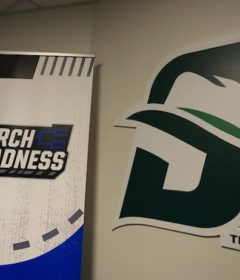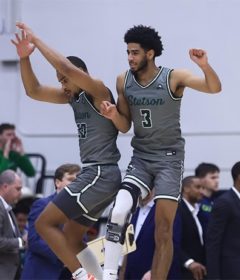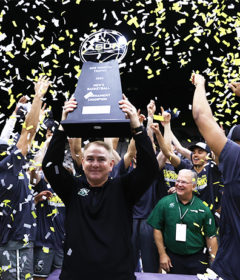Weekly Updates on Isolation, Dining and Testing
Weekly Update 15
President’s Weekly Webinar
Join President Christopher F. Roellke, PhD, for his next weekly update webinar on Thursday, Sept. 3, 4-5 p.m. The webinars are open to students, faculty, staff and the Stetson community for DeLand and Gulfport.

Register now for the webinar.
Submit your questions and comments.
Future webinar dates and registration links are on Messages from the President. Webinar recordings are on the Safer Stetson website under Latest Updates.
Safer Campus Task Force Updates
New FAQs
New or updated FAQs have been added to the Safer Stetson website in these categories:
- Isolation
- Dining
- Everbridge
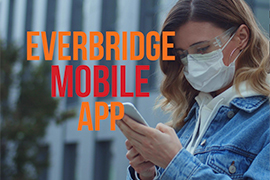
Everbridge App: What happens when you hit the wrong response?
If you accidentally select “Yes” to the wellness questions, you will need to go to a Wellness Station to be cleared for the day. On the DeLand campus, you would go to the station located in the Rinker Welcome Center. In Gulfport, go to the Horseshoe, and on the Tampa campus, go to the Public Safety desk.
Rapid Antigen Testing on Campus
Safer Campus Task Force is happy to announce regularly scheduled rapid antigen testing on campus. In collaboration with AdventHealth and CentraCare, testing will be offered on campus every other week throughout the fall semester. The rapid antigen tests are free to all members of the Stetson community and results are available in 15 minutes. Testing options and dates on campus are on the Safer Stetson website under the Healthy Hatters button.
Also, during the fall semester Stetson students can get free rapid antigen testing at any CentraCare location. You MUST provide both of these required forms in order to get tested. You can make an appointment online here (select the option for COVID-19 Testing). Results will be shared with Stetson Health Service and the Dean of Students Office to help provide support for COVID positive students.

Face Coverings Policy Updated
Stetson’s Face Coverings Policy has been updated to include language explaining that “neck gaiters, face masks with exhalation valves, and face shields (unless used in conjunction with an acceptable cloth face covering) are not sufficient as a face covering.” Read the policy for more information.
Changes for Visitors
Changes have been made regarding visitor screening. “Visitors” refers to all guests of the university other than postal carriers/delivery drivers and external vendors who are permanently assigned to work at a Stetson campus. The new rules apply to all visitors and are effective Aug. 24.
Campus visits are restricted to necessary visitors only. The university cabinet remains responsible for defining what is necessary visitor for their areas. Questions on what is necessary in each division, school, and college should be directed to the supervising university cabinet member. Campus hosts are responsible for communicating the current visitor policy to their guests prior to the guests’ arrival on campus. This includes informing visitors that they will not be permitted on-campus if they are experiencing COVID-19 like symptoms or have a known COVID-19 exposure. This process does not apply to spectators at intercollegiate athletic events nor visitors in residential buildings. Please defer to the guidance issued by those respective departments.
All approved visitors must follow Stetson’s physical-distancing requirements.
- Stay at least 6 feet (about two arm’s length) from other people.
- Do not gather in groups larger than nine.
- Stay out of crowded places and avoid mass gatherings.
- Wearing masks or face coverings on all Stetson University campuses, including all indoor and outdoor spaces. If a visitor does not have their own covering, one will be provided to them at the check-in station.
All visitors must check in at a campus Wellness Station and show a valid photo ID. A COVID-19 screening, including a brief questionnaire and a non-invasive temperature check, is required for all visitors. The questionnaire responses will be reviewed and compared to the current screening rubric. If a visitor indicates potential COVID-19 symptoms or a potential COVID-19 exposure, they will be asked to leave campus. Campus staff will record the visitor’s name, contact information, and the name of their campus host.
Visitors will receive day badges and are required to display them on their person. Badges will be color coded by day. Before- and after-hours visitors must visit Public Safety for screening. Campus hosts are responsible for greeting their guests at the exterior door of their building and granting access.
Please note: At this time, employees are not permitted to bring their children into campus buildings.
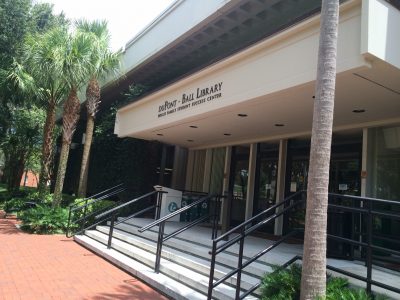
New Hours for duPont-Ball Library
Due to COVID-19 accommodation and adjustment staffing shortages, the library hours will be reduced starting Monday, Aug. 24:
Monday-Thursday: 9 a.m.-8 p.m.
Friday: 9 a.m.-6 p.m.
Saturday: 11 a.m.-6 p.m.
Sunday: 11 a.m.-8 p.m.
- The 24/7 computer lab with printer on the north side, ground floor level of the library is available to students using the card-swipe entrance from the Nemec Courtyard.
- Our Ask-a-Librarian service hours are not affected by this change and librarians are available to assist you remotely.
- Remember that a large part of our collections is available 24/7 online.
- For additional study spaces, please see Where to Hang Out on Campus.
Stetson Dining: Meals in Isolation and More
Some residential students have questions about meal delivery while they are in isolation. Please contact Taylor Mills at [email protected] for any questions or concerns about delivery, dietary needs and restrictions, or concerns about deliveries you are currently receiving. Stetson Dining is working in partnership with Stetson’s Safer Campus Task Force, Residential Living and Learning, and the Dean of Students to make this process as comfortable as possible.
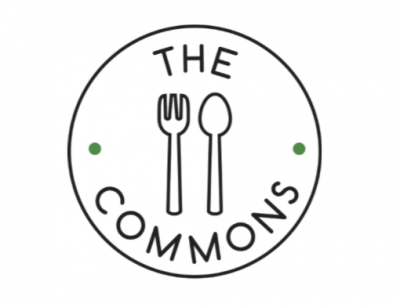
Stetson Dining is working in partnership with the Safer Campus Task Force to develop plans that meet the dining needs of the Stetson community while ensuring safety as the number one priority. While the pandemic has certainly caused changes to some food stations and delivery models, we continue our commitment to serving you.
Find out more about Stetson Dining’s efforts to keep you safe, cleaning/sanitizing protocol, current hours, popular food station options, retail outlets, reduced wait times, and Boost app (coming soon) and more on the Safer Stetson website or visit Stetson Dining online.
Isolation Information
Based on the current guidelines from the Florida Department of Health, members of the Stetson Community should isolate:
- If they had “close contact” with someone who is COVID-19 positive. Please know that a negative COVID-19 test does NOT remove the need for a 14-day isolation if close contact occurred. Close contact is defined by the CDC as being within six feet of someone for fifteen minutes or more.
- For 10 days from the onset of sick symptoms matching our criteria. (See Health Response Protocol)
- For 10 days from the date of a COVID-19 test if they receive a positive test result.
Student Isolation: Stetson supports residential students in isolation by moving them or their suitemate/apartment mate as needed to minimize exposure to the overall community. The majority of isolation spaces are currently in Plymouth Apartments and our partnership hotels.
Commuter Student Isolation: Resources are shared with commuter students living in isolation in a household environment. Staff will reach out to all students in isolation to assist students with contact tracing. Also, students will be connected to virtual engagement options, and get assistance with notification of faculty, supervisors and other organizations as requested.
Meals: Residential students have meals delivered to them daily between noon and 3 p.m. This occurs for those isolating in the hotels and on-campus. Sign up to help deliver meals HERE.
Who gets notified/when: The Dean of Students Office notifies Associate Deans of students who are isolated. If a student is COVID-19 positive and physically attended class, a separate notification goes to the faculty member. Notifications about spaces where a COVID-19 positive individual has been also automatically go to facilities for enhanced cleaning. If requested, the Dean of Students Office will notify parents, supervisors and organization leaders. In the case of an employee, Human Resources notifies the individual’s supervisor. The Safer Stetson website is updated every business day with the total current COVID-19 positive counts.
Clearance protocol: Individuals are notified by email when they are cleared. Current local Department of Health guidelines include:
- Close contact — quarantine for 14 days from exposure, even if you get a negative test result
- Positive test — 10 days isolation from positive test date
- Symptoms — Must be symptom free for 24 hours plus 10 days from the onset of symptoms
Student reminder on preparedness: At all times students should have enough personal items in their room for 14 days. Please have the ability to pack quickly what you would need for isolation. A rolling suitcase works best. Don’t forget: thermometer, toiletries, medication, clothes, towels, sheets, electronics, chargers, water and your books. You will not be able to go back to your room once you are moved to isolation.
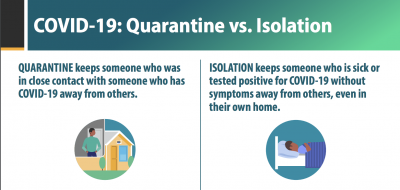
Is it Isolation or Quarantine?
Isolation is used to separate people infected with SARS-CoV-2, the virus that causes COVID-19, from people who are not infected. People who are in isolation should stay home until it’s safe for them to be around others. In the home, anyone sick or infected should separate themselves from others by staying in a specific “sick room” or area and using a separate bathroom (if available).
Who needs to isolate?
- People who have symptoms of COVID-19 and are able to recover at home.
- People who have no symptoms (are asymptomatic) but have tested positive for infection with SARS-CoV-2.
Quarantine is used to keep someone who might have been exposed to COVID-19 away from others. Quarantine helps prevent spread of disease that can occur before a person knows they are sick or if they are infected with the virus without feeling symptoms. People in quarantine should stay home, separate themselves from others, monitor their health, and follow directions from their state or local health department.
Who needs to quarantine?
- People who have been in close contact with someone who has COVID-19—excluding people who have had COVID-19 within the past 3 months.
- People who have tested positive for COVID-19 do not need to quarantine or get tested again for up to three months as long as they do not develop symptoms again. People who develop symptoms again within three months of their first bout of COVID-19 may need to be tested again if there is no other cause identified for their symptoms.
- People returning from cruise travel.

